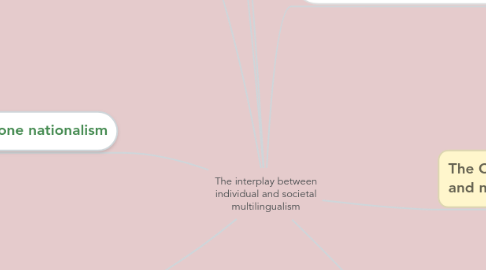The interplay between individual and societal multilingualism
作者:Lykke Broström


1. Some consequences for First Nations people
1.1. language situation of the Inuit in Artic Quebec - for historical reasons they are bilingual in english and indigenous language
1.2. now they are part of quebec which is a french speaking province - nowadays ledd Inuktitut and more french is offered in schools along with english DUE TO increasing instrumental value of french
1.3. french is however not widely used outside of school - student son french get little practice and struggle to acquire the language
1.4. concludingly: this trilingual situation has placed pressure on residents in trying to decide on the best education for their children
2. Quebec francophone nationalism
2.1. french is major language in Quebec, but minority language in Canada
2.2. many feel their language is endangered and needs protecting form the english language and speakers
2.3. Quebec has resultantly opted for monolingual policy - going against Canadian policy of bilingualism and multiculturalism
2.4. nationalists believe that societal monolingualism in french is necessary in quebec for french to have a chance to survive
3. Individual bilingualism through institutional monolingualism
3.1. research carried out in schools who use french as medium of instruction and rely on ideology of institutional monolingualism - schools turned into french environments
3.2. nationalism of Quebec is here turned into institutional nationalsim through the creation of institutions run by and for francophones
3.3. the aim is however to create bilingual students as it is thought that english will be acquired anyhow
3.4. 3 types of students found in school: - french L1 speakers - middle class english speakers wanting to become bilingual to improve job options - new immigrants from somalia, haiti etc who speak french as L1 or L2
3.5. 2 stream of french were offered: 1.advanced which many middle class franco and anglophones were found 2.more general stream with many working class french and immigrants
3.5.1. through trying to enforce french by the school, english became the language used for "backstage" talk
3.5.1.1. english used to conquer authority i school
3.5.2. the schools mono linguistic policy was only found in the advanced stream
3.6. teachers struggled to keep mono linguistic policy due to importance of english in students lives
4. Exclusion through French, inclusion through English
4.1. friendships were especially seen made through hip hop music
4.2. english made it easier for the previously marginalised students (eg somalians) to be fully included in the school community
5. Shifting ideologies
5.1. dilemma of schools: how to reconcile authenticity with pluralism
5.2. teaching french is becoming more difficult as english is promoted due to globalisation, however a shred view between the student were that french was seen as medium for advancement and linguistic capital
6. Conclusion: the commodification of language
6.1. shift from a politics of identity to a politics of linguistic capital has opened uo new opportunities for francophone communities in english-speaking parts of canada
6.2. resulted in growth of heritage tourism - marketing of 'authentic' cultural artefacts
7. Main idea: case of Canada (Monica Heller's research) - showing how Quebec attempt to achieve individual bilingualism through an official policy of societal or institutional monolingualism
7.1. concludes: "many of the somali students talked about the days of the major problems of segregation and racial discrimination at the school asa thing of the past" ADDING "general tendency towards segregation remained, and the progress made was fragile"
8. The Canadian policy of bilingualism and multiculturalism
8.1. english and french are the official language - historical reasons (colonized by Britain and France)
8.2. the Quiet Revolution
8.2.1. - 1960 Quebec
8.2.2. moment to gain power and control for francophones - led to ACT which enriched french-english bilingualism by requiring all federal institutions to provide services in both english and french
8.3. multiculturalism act
8.3.1. canada sees itself as a melting pot of cultures - cultural pluralism
8.4. education
8.4.1. french immersion programs - one aim is to allow anglophone children to learn french
8.4.2. immersion programme extended to indigenous languages

